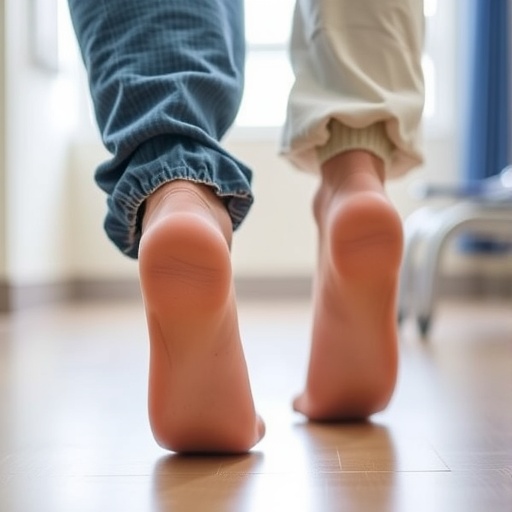Chemotherapy-Induced Peripheral Neuropathy: A Neglected Crisis in Cancer Survivorship Care
Chemotherapy has revolutionized cancer treatment, significantly improving survival rates for many patients worldwide. However, its life-saving benefits often come at a cost, with irreversible nerve damage to the lower limbs emerging as one of the most debilitating side effects. Known as Chemotherapy-Induced Peripheral Neuropathy (CIPN), this condition affects nearly half of patients undergoing certain chemotherapy regimens, particularly those involving platinum-based agents such as Oxaliplatin. Despite its severity, a groundbreaking study from the University of South Australia reveals a distressing gap in supportive care: fewer than 20% of patients at risk utilize podiatry services that could dramatically alleviate their symptoms.
CIPN manifests as a constellation of sensory and motor impairments, including numbness, burning sensations, tingling, and muscle weakness that predominantly affect the feet. These symptoms often develop insidiously during or after chemotherapy, dramatically reducing patient quality of life. The underlying pathophysiology involves the neurotoxic effects of chemotherapy agents that damage peripheral nerves, especially in distal limbs where nerves are longest and most vulnerable. This damage disrupts normal nerve signaling, leading to the characteristic “pins and needles” feeling and loss of proprioception. Importantly, these neurological deficits can persist indefinitely, highlighting the critical need for early detection and management.
The University of South Australia conducted a comprehensive analysis of 3,292 colorectal cancer patients, among whom 82% received Oxaliplatin-based chemotherapy. Colorectal cancer represents a significant cohort given the widespread use of neurotoxic chemotherapy in its management. Despite the well-documented risk of CIPN associated with Oxaliplatin, the study revealed a startling statistic: only a minority of these patients engaged podiatry services within five years post-treatment. This lack of engagement suggests a profound disconnect between the recognition of CIPN symptoms and the integration of foot care into cancer survivorship plans.
Podiatrists possess specialized skills in managing lower limb disorders and are uniquely positioned to address the multifaceted challenges posed by CIPN. Their expertise encompasses assessment, prevention, and treatment strategies aimed at preserving neuromuscular function, preventing falls, and minimizing foot trauma. Early podiatric intervention can contribute to fall prevention—a critical factor given that CIPN-related balance impairments significantly heighten fall risk. Moreover, effective podiatric care can reduce the incidence of ulcerations and infections, which, if left untreated, may escalate to amputations. These complications underscore the potential life-altering consequences of neglecting foot health in chemotherapy patients.
Current oncology protocols often overlook podiatric involvement, focusing primarily on cancer control while underappreciating long-term functional impairments. This study highlights the urgent necessity for oncology care teams to integrate routine podiatric evaluations into survivorship programs. By routinely screening for CIPN symptoms and referring patients early to podiatrists, clinicians could enhance patient outcomes, reduce morbidity, and improve adherence to chemotherapy regimens by mitigating symptom severity. Indeed, severe CIPN symptoms sometimes prompt patients to discontinue treatment prematurely, adversely impacting cancer prognosis.
The absence of national guidelines specific to CIPN prevention and management in Australia exacerbates the challenge of coordinated care. Presently, the solitary published clinical pathway for CIPN management does not incorporate podiatry services, signifying a critical oversight in multidisciplinary care frameworks. To bridge this gap, the UniSA research team, with consensus from Australian podiatry professionals, has developed clinical recommendations emphasizing podiatry’s essential role. These guidelines advocate for early assessment and ongoing management to combat CIPN symptoms proactively, though awareness and implementation of these protocols remain limited.
Understanding the neurobiological mechanisms behind CIPN is pivotal in developing effective care strategies. Neurotoxicity induced by chemotherapy agents leads to axonal degeneration and mitochondrial dysfunction in sensory neurons, impairing nerve conduction velocity and causing debilitating sensory deficits. The resultant proprioceptive loss impairs patients’ ability to maintain balance, increasing susceptibility to falls and subsequent injuries. Podiatric interventions aimed at strengthening foot musculature, improving proprioceptive feedback, and providing protective orthotics can counterbalance these deficits, thereby safeguarding patient mobility and independence.
The study emphasizes that podiatry’s role transcends symptom relief, encompassing vital preventative care that reduces downstream complications. Considering that novel pharmacological agents to prevent or reverse CIPN are currently unavailable, supportive care through podiatry becomes indispensable. Preventing ulcerations and infections in the neuropathic foot can significantly diminish hospitalizations and improve survivorship quality, especially among aging cancer populations with comorbidities such as diabetes.
Education forms another cornerstone for addressing this silent crisis. Both patients and oncology clinicians often harbor limited knowledge regarding the benefits of podiatric care in CIPN management. Enhancing awareness through targeted education campaigns could promote earlier referrals and empower patients to seek necessary interventions. Early identification and treatment may also alleviate psychological distress linked to persistent pain and functional impairments, fostering better overall wellbeing.
The UniSA research elucidates a pressing need for systemic change in cancer care models. Embedding podiatry within multidisciplinary oncology teams, alongside oncologists, nurses, and physiotherapists, could holistically address the complex challenges posed by CIPN. Such collaboration would facilitate integrated pathways where referrals are streamlined, and patients receive timely, personalized care to manage neuropathic symptoms effectively.
In conclusion, Chemotherapy-Induced Peripheral Neuropathy remains a significant yet underrecognized adverse effect of cancer treatment, profoundly impacting lower limb function and patient quality of life. The University of South Australia’s study casts a spotlight on an alarming service gap where many patients miss critical podiatric support that could mitigate CIPN’s damaging effects. Addressing this involves not only clinical guideline revisions and health system reforms but also an urgent cultural shift within oncology care paradigms. By repositioning podiatry at the forefront of CIPN management, healthcare providers can enhance survivorship outcomes and ensure that cancer treatment’s triumph is not overshadowed by preventable complications.
Subject of Research: Not applicable
Article Title: Patterns and Factors Associated with Podiatry Service Use Among Colorectal Cancer Patients Following Chemotherapy in South Australia: Focus on Chemotherapy-Induced Peripheral Neuropathy (CIPN)
News Publication Date: 3-Oct-2025
Web References: http://dx.doi.org/10.2147/JMDH.S552589
References: The authors declare there are no competing or conflicts of interest in this work.
Keywords: Cancer treatments, Chemotherapy, Side effects, Medical treatments




